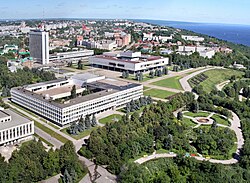Ul’yanovsk
| Ulyanovsk Ульяновск (Russian) |
|
|---|---|
| - City - | |
 View of Ulyanovsk |
|
 Location of Ulyanovsk Oblast in Russia |
|
|
|
|
|
|
|
|
|
|
| City Day | June 12 |
| Administrative status (as of July 2011) | |
| Country | Russia |
| Federal subject | Ulyanovsk Oblast |
| Administratively subordinated to | city of oblast significance of Ulyanovsk |
| Administrative center of | Ulyanovsk Oblast, city of oblast significance of Ulyanovsk |
| Municipal status (as of July 2011) | |
| Urban okrug | Ulyanovsk Urban Okrug |
| Administrative center of | Ulyanovsk Urban Okrug |
| Head | Alexander Pinkov |
| Representative body | City Duma |
| Statistics | |
| Area | 316.9 km2 (122.4 sq mi) |
| Population (2010 Census) | 613,786 inhabitants |
| - Rank in 2010 | 20th |
| Density | 1,937/km2 (5,020/sq mi) |
| Time zone | SAMT (UTC+04:00) |
| Founded | 1648 |
| City status since | 1796 |
| Previous names | Simbirsk |
| Postal code(s) | 432xxx |
| Dialing code(s) | +7 8422 |
| Website | www |
| on | |
Ulyanovsk (Russian: Улья́новск, IPA: [ʊˈlʲjanəfsk]) is a city and the administrative center of Ulyanovsk Oblast, Russia, located on the Volga River 705 kilometers (438 mi) east of Moscow. Population: 613,786 (2010 Census);635,947 (2002 Census);625,155 (1989 Census).
The city, founded as Simbirsk (Симби́рск), is the birthplace of Alexander Kerensky and Vladimir Lenin (born Ulyanov), for whom it was renamed in 1924. It is also famous for its writers such as Ivan Goncharov, Nikolay Yazykov and Nikolay Karamzin and painters (Arkady Plastov and Nikas Safronov).
Simbirsk was founded in 1648 by the boyar Bogdan Khitrovo. The fort of "Simbirsk" (alternatively "Sinbirsk") was strategically placed on a hill on the Western bank of the Volga River. The fort was meant to protect the eastern frontier of the Russian Empire from the nomadic tribes and to establish a permanent Imperial presence in the area.
In 1668, Simbirsk withstood a month-long siege by a 20,000-strong army led by rebel Cossack commander Stenka Razin. Also in Simbirsk another country rebel, Yemelyan Pugachev, was imprisoned before execution. At the time Simbirsk possessed a wooden kremlin, which was destroyed by a fire during the 18th century.
...
Wikipedia



